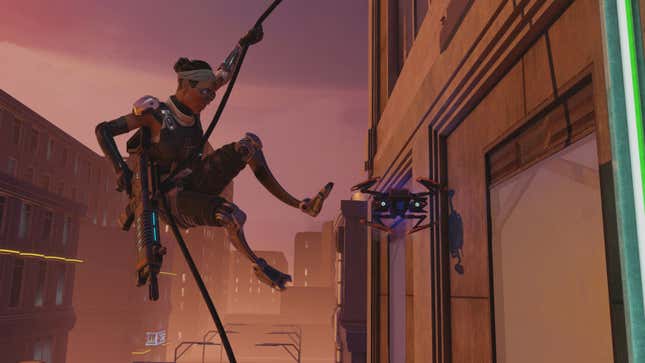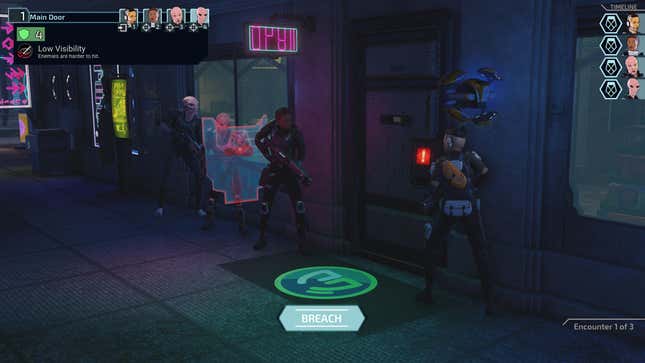
XCOM: Chimera Squad isn’t your normal kinda XCOM experience, and while in some ways (reduced scale, smaller missions) that’s a bummer, in other ways—namely the new “Breach” system—it has been an absolute pleasure to play.
Nathan has played more of the game than I have, so definitely go and check out his impressions piece if you’d like to know more about the game overall, but I just wanted to take a minute today to talk about that breach system, which is the one big gameplay change for this spin-off and is I think one of the most successful turn-based innovations in years.
It works like this: in Chimera Squad, missions are no longer sprawling affairs where you spend half your time traversing the map with your heart in your mouth. Instead, with the game’s focus now on explosive SWAT team work, the action is now focused on specific room-by-room encounters, and each time you move between them, you get to do a Breach move.
This pauses the game and gives you a chance to plan a single, dramatic entrance to the new area, where a door is kicked or blown down and your entire team comes storming in, guns blazing. It sounds like a very fast, Call of Duty-kinda move, but it actually suits the turn-based nature of XCOM to a tee.
I’m not going to lie, there are downsides to this, which Nathan has already spelled out. It reduces the scale of missions, and changes the nature of them too; while the story is set in the XCOM universe, this at times feels more like an old Rainbow Six game than the kind of thing we’re used to from in this world.
(Please, Ubisoft, make a Rainbow Six game like this.)
I get why some fans are down on this, even taking into the account the fact this is an experimental spin-off. Yet that’s partly why I’ve embraced it; free from the shackles of legacy and expectation, Chimera Squad has been free to try some wild new shit like Breaches, and I love it.
To get big-picture on you for a moment, I think turn-based tactics is the single best type of gameplay experience in the world. It has been tried and tested over thousands of years, on tabletops and computers, from chess to Advance Wars, and remains a pillar of so many genres because it works. You get time to think and plan and get devious, which is rewarding on a wider strategic level, but there’s also a more immediate satisfaction to come from seeing the planned move take place in a singular moment, that instant of dread and exhilaration between a plan being an idea and becoming reality.
The main XCOM games knew this, of course. In XCOM, when you shoot at a bad guy, you don’t simply shoot, your entire view is shifted to a badass cutscene, where your abstract click translates into an intensely physical and violent moment. It was the game’s way of saying, OK, you planned this, now here’s your little dopamine reward for a plan well executed. It looks cool, but the real rush is the fact you orchestrated that moment, not a writer.
That point where planning meets execution, where the rubber meets the road, is absolutely my favourite thing in all of video games. Total War will ask you to spend hours shuffling armies around and building castles in a turn-based setting, but when it’s time for action, it doesn’t just reward you with a cutscene, it transitions into an immense real-time battle, your dry tabletop manoeuvres replaced with blood-curdling screams and a hail of arrows. That’s an extreme example, but everything from Civilization’s battle animations and diplomacy to Fire Emblem’s dialogue scratches the same itch.
I’m not saying this XCOM diversion is as good as any of those games overall, but when it comes to the point where that itch is scratched, it is sharp as hell. Breaching is ridiculously satisfying. You’re given pause and time to think, as the game lets you assign team members to each door or window, putting them in the order they’ll move and shoot, and even weighing up who to send where, and whether some entry points should be used at all since they carry great risk.
It’s probably the single heaviest tactical decision you’ve ever had to make in an XCOM game. Rather than the broad brushstrokes of whole-team strategy, or the focus of an individual unit’s turn, here you’re taking on a bit of both: planning for every unit to do something, but by clicking BREACH it’s being executed in the same space of time as you’d normally move one guy.
Oh, BREACH. Click that button and everything you’ve just lined up stops being strategy and becomes action. An explosion blows a door in, the first person storms into the room, gun raised, you select a target and fire. Then you get to do it again. And again. And again, until everyone’s rushed into the room and got a shot off.
The whole team moves in slowed-down bullet time, a metaphor for Chimera Squad itself, a longer XCOM experience distilled down to its purest form, your weapon and target choices executed in seconds instead of minutes.

It is exhilarating, every time, no matter how many times I’ve done it or what gear I’ve got equipped, to the point where returning to regular ol’ XCOM-style tactics at the conclusion of the move while you finish off the rest of a room—a base experience that was at the heart of two of the best games ever made—is almost a disappointment.
Which is fine, this is a lesser game than the full XCOM experience, no matter how many new tricks it was able to bring to the party. Outside of Breach mode’s thrills you really feel the game’s limitations, and its narrative slant, while helping flesh out the universe its set in, robs the game of its roster composition, one of the series’ greatest strengths.
But for those few, shining seconds, when turn-based decision-making and real-time action come together, this is as perfect a video game moment as I have ever played.